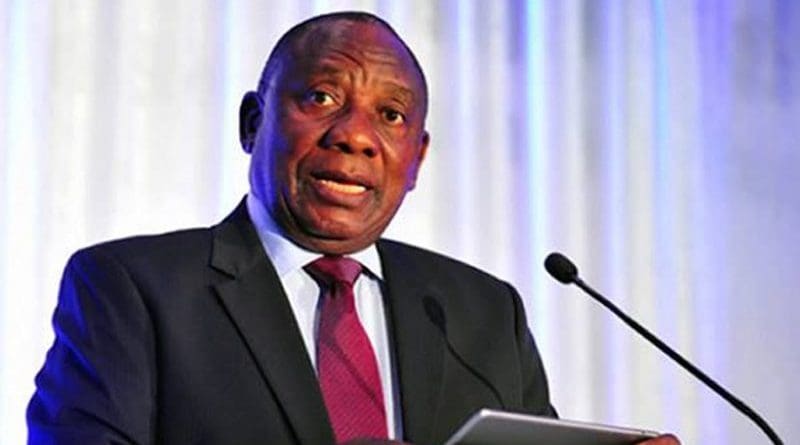South Africa: Populism’s Next Target – OpEd
By Arman Sidhu*
Following news of Jacob Zuma’s resignation from office, Jessie Duarte, the Deputy Secretary General of the African National Congress (ANC) party, struck a tone that was more elegiac, rather than energetic about the former president’s departure. During a press briefing immediately after Zuma’s speech, Duarte noted that the ANC’s “decision to impose a recall was taken only after exhaustive discussions,” lauding Zuma as a “disciplined member” of the ANC. That the decision to remove Zuma, whose epoch is best characterized by economic mismanagement, rampant unemployment, increased crime, and corruption took so long spells trouble for the ANC.
Cyril Ramaphosa, who succeeded Zuma as the president of the ANC in December and will take over the reins from Zuma once more in the office of the presidency, inherits a nation that has seen the erosion of its democratic institutions and has slipped into irrelevance among the world’s notable emerging economies. Furthermore, as the only majority party in power during the youthful history of South Africa’s democracy, the ANC has seen its brand blemished by recalls that took down Zuma and his predecessor, Thabo Mbeki. As demonstrated by voters in the past two general elections, the appetite for undisputed ANC control has declined.
With a general election slated for next year, Ramaphosa and the ANC face a perfect storm for a populist rebuke: acute unemployment, backlash against the “establishment,” and tepid economic prospects for the lower and middle-class. Filling the void regarding these issues is the adept Democratic Alliance (DA) party and the burgeoning newcomer, the Economic Freedom Fighters (EFF). While in opposition, both parties have proven to be deft in organizing and successfully shifting focus toward the rampant cronyism perpetuated by Zuma, which has become portentous enough to warrant a “state capture” inquiry. With the centrist DA party in position to siphon votes from moderates, the EFF taps into a burgeoning base of South Africans who, facing limited economic prospects, have become aggravated with the bureaucracy and sense of entitlement emanating from the ANC.
In his first State of the Nation address, Ramaphosa attempted to allay the anger of South Africans who see Zuma’s departure as long overdue and a lazy attempt to repackage the ANC’s product ahead of elections. Ramaphosa unveiled his policy goals which focus heavily on alleviating the unemployment epidemic through the introduction of a minimum wage, temporary employment programs, and free higher education. Ramaphosa also referenced the mining and tourism industries as critical to reinvigorating an economy that was once held in the same regard as India and China as an addendum to the “BRICS” designation.
Nevertheless, unemployment in the country remains pinned at nearly 27%, with informal work providing economic sustenance for many poor South Africans. Estimates of youth unemployment reach figures as high as 60%, leading many young, black South Africans susceptible to parties promising radical reform and an upending of South Africa’s political and economic systems. Perhaps no party in South Africa is in better place to improve its results in 2019 than the EFF, which received 6% of the vote in the 2014 general election, after having been founded only a year earlier. It’s leader, Julius Malema is a former President of the ANC’s youth wing and can proudly exclaim his expulsion from the ANC as verification of his dedication to reform. Branding itself as Pan-Africanist, the EFF incisively invokes the teachings of Frantz Fanon and Thomas Sankara, figures who, decades after their deaths, resonate positively on the continent. Their platform, which prioritizes universal healthcare and education, nationalization of key industries, and land expropriation possesses enough pathos to tap into disgruntled voters. Prophetic signals of the EFF’s influence can be seen in the EFF’s successful lobbying efforts to pass a motion in parliament that moves forward a constitutional amendment that would permit uncompensated land expropriation.
As a former labor union leader turned businessman, Ramaphosa exudes the aura of a pragmatic technocrat, a trait that delights investors but will not be enough to placate the general populace. The prolonging of Zuma’s tenure had a schismatic effect on the party and only served to cement factions within the ANC that Ramaphosa will need to transcend in the year he has left to govern before elections. The absence of Zuma alone is insufficient in unwinding the structural damages that have sullied the probity of South Africa’s public entities.
While the electoral math still supports the ANC obtaining a majority of some kind in 2019, to curb the ascending influence of the DA and the EFF, Ramaphosa will need to speed up what have been languid economic reform efforts by the ANC. At the same time, countering the opposition’s growth will require striking a balance in the seemingly Manichean conflict between capitalizing on investor confidence and mollifying voters who will not hesitate to remind the ANC that its relevance is not eternally guaranteed. A changing of the guard, while welcomed, is only the first step to reversing a potential populist uprising spearheaded by the EFF.
The opinions, beliefs, and viewpoints expressed by the authors are theirs alone and don’t reflect any official position ofGeopoliticalmonitor.com.

